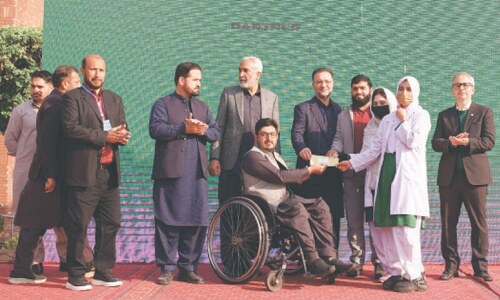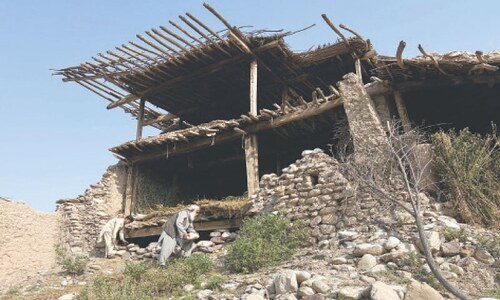PESHAWAR: An accountability court here on Thursday acquitted two former provincial police officers in a high-profile case of the alleged embezzlement of funds in the procurement of weapons for their department in 2009-10.
Judge Naveed Ahmad Khan accepted the applications filed by the two officers, including Abdul Majeed Marwat, a former commandant of Frontier Constabulary, and Abdul Latif Gandapur, the then additional IGP (Operation), under Section 265-K of the Code of Criminal Procedure.
Section 265-K empowers the trial court to acquit an accused at any stage of the trial if it considers that there is no probability of the accused being convicted of any offence.
In July, the court had acquitted four other officers, including the then DIG Headquarters Peshawar, Dr Mohammad Suleman (now IB DG), the then AIG (Establishment) at CPO, Kashif Alam (now AIG), the then DIG (telecommunications) Sadiq Kamal Orakzai (now retired), and a DIG at the Central Police Office (CPO), Sajid Ali Khan (now DIG Bannu).
The applicants had requested the court not to frame charges against them and order their release saying there is no evidence against them in the case.
They were charged with embezzling funds in arms procurement
They had contended that there was no material available with the trial court to indict their clients and further proceeding with their case would only be a waste of time.
Currently, former provincial police chief Malik Naveed Khan and budget officer of police Jawed Khan are the prime accused in the case. They’re indicted on July 7, 2015, by the accountability court.
They were indicted for receiving kickbacks from Arshad Majeed, a private contractor, who turned approver in the case, and causing a loss of Rs2.031 billion during the procurement of weapons and equipment for the police department in 2009-10. The prime accused have been facing trial for a couple of years.
Rest of the accused named in the corruption reference were not arrested.
The National Accountability Bureau, Khyber Pakhtunkhwa, had claimed that those six officers were chairmen and members of the relevant purchase committee and didn’t fulfil their responsibilities during purchase of those weapons.
The lawyers for applicants contended that their clients were senior police officers carrying impeccable reputation, mostly serving on sensitive posts.
They argued that despite no allegations against their clients, they were named in the reference which was outcome of presumptions and surmises.
The reference in the case was filed by the NAB against 10 people, including the two prime accused, the six police officers, who were not arrested, former provincial chief minister Ameer Haider Hoti’s brother Amir Ghazan Khan and his brother-in-law Raza Ali.
Ghazan was later acquitted by the court, while Raza was freed after he made an plea bargain agreement with the NAB.
Contractor Arshad Majeed was initially arrested by the NAB on Feb 21, 2013, on the charge of giving kickbacks to different people, including Malik Naveed and Javed Khan, for securing major contracts.
However, he was released on bail granted by the Peshawar High Court after he agreed to voluntarily return Rs102 million. He was not charged in the reference as the NAB claimed that he had turned approver and will appear as the prosecution witness.
Published in Dawn, September 10th, 2021


































